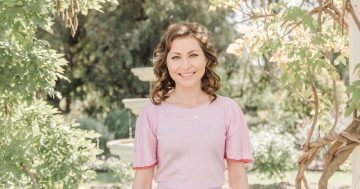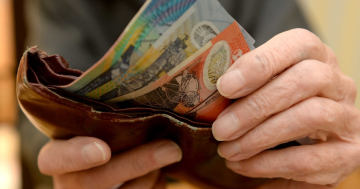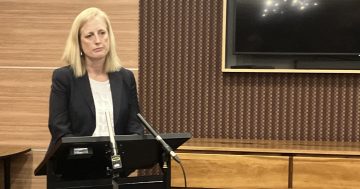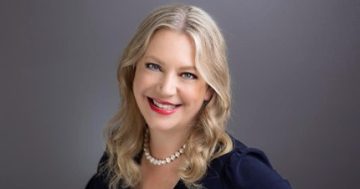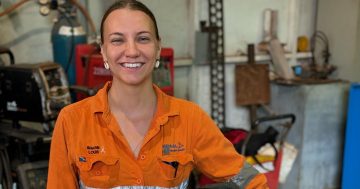Meg Watson* discusses what its like to take the first steps into investing with three women who’ve done it.
 Have you ever wondered how exactly people learn how to invest?
Have you ever wondered how exactly people learn how to invest?
Were some of us born with a working knowledge of managed funds and the Australian Securities Exchange (ASX)?
Did the rest of us miss a very important day at school?
The ASX’s 2020 Australian Investor Study found that 45 per cent of those who began investing in the 12 months prior were female.
That figure is up from 31 per cent when you look at the people who started investing five to 10 years ago.
So what’s it like to take those first steps? And does it get any easier once you start?
Here’s what three women learned during their first year investing.
Investing in crypto is super time-consuming
At the start of this year, comedian Lucinda Price (aka Froomes) knew nothing about investing.
“My knowledge was I knew the word ‘shares’ and I knew finance people had money,” she says.
But when she “decided to become a millionaire” in late-April, she had no choice but to learn.
It all started when she put a question to her 38,000 Instagram followers: what’s the best way to double $500 in a week? The response was overwhelming.
“The vast majority said crypto,” she said.
“And a lot of the people giving me tips were women … I was like, ‘All these young women are doing it. I can do it’.”
During the course of that week she learned how to buy cryptocurrency after going deep in Reddit forums, she chose a coin with a decent business plan and “the most ridiculous name”, and she rocketed past her original tongue-in-cheek target of $1,000.
“Technically the thing went up to $14,000, but I think I would have walked away with about $10,000 [after tax],” she says.
Ms Price sold her coin after just one week, correctly predicting that a fall was coming.
In the volatile world of cryptocurrency, it’s a huge success story.
But it’s not an experience she would recommend for everyone.
“You’re constantly glued to it,” she says.
“I couldn’t stop refreshing this [crypto] app, watching the graph go up and down … It was a full-time job.”
And that’s without getting into the initial fears of being scammed.
For her, that effort was worth it because she had set a comfortable limit on her investment.
“As much as I wanted to double [the money], I was happy to lose it … If you had [$20,000] in there you’d go crazy and pull your hair out.”
Mariam Mohammed, the co-founder of a social enterprise that makes financial education accessible for women, says this is a great mentality.
“[Investments like cryptocurrency and day trading] are different to long-term investments — like your super … They are essentially as good as gambling in a casino,” she says.
“You should choose an amount of money that you’re comfortable with losing.”
You should find the path that’s right for you
Katrina Walker, 30, wasn’t so willing to risk her money.
She started investing in late 2019 after receiving an inheritance from her grandparents.
After clearing her credit card debt, she put her remaining eggs in many baskets: a micro-investing platform as well as a number of exchange traded funds (ETFs) and individual shares.
It’s a strategy she landed on after a lot of independent research.
“I was literally [searching] like ‘ethical stocks to buy, small quantities’, trying to figure out how to do it,” she says.
But she didn’t get much help from the business pages of her local newspaper.
“The most I’ve learned has been from podcasts, [personal newsletters] and research in Facebook groups.”
There are a huge number of personal finance influencers specifically making educational content for women and younger investors these days, and this content often produces large online communities which trade tips and advice.
This has its problems: experts have issued warnings about the potential spread of misinformation.
But for Ms Walker, hearing from people with similar perspectives or experiences was hugely helpful.
Prior to that, most of the tips she was hearing came from family.
“My dad does a bit of investing but he is very boomer,” she says.
“He directed me towards gold and banks … but they don’t align to my values.”
Ms Walker wants to be as ethical and intentional with her money as possible: “I want to build wealth but I don’t want to be Scrooge McDuck”.
Ms Mohammed says there are “no right or wrong answers with any investments: it all depends on your personal circumstances and preferences”.
“You should make choices based on that [rather than] what people you trust are saying or what online forums are saying.”
It’s all about the long game
Kirsty, 44, hadn’t really looked into investing before last year.
She had her hands full with a mortgage on her one-bedroom apartment.
Any extra money she had would go towards that and the odd holiday.
But with a little bonus coming up at work and travel off the cards, she decided to do some research on more lucrative alternatives.
“Interest rates were just flat and nothing, so [I figured] now’s the time to start doing something to grow and compound interest over a whole bunch of years … [Investing] offers more than a savings account,” Kirsty says.
She quickly found it offers more unpredictability than a savings account too.
Though Kirsty describes her investments as “very risk-averse” — some “no frills” ETFs and shares in biological science (an area she studied in) — they could not escape the roller-coaster of risk that was 2020.
“At first, [when the share goes up in value] you think ‘I’m a genius! Why didn’t I do this before?’
“And then it just wipes off your profit as soon as you can make it.”
“A month or two later, it’s like ‘oh ok. I’ve made nothing now’,” Kirsty says.
She has no plans to pull the money though.
For her, this was always a long-term plan — something to supplement her superannuation, which is “not the highest”.
“It’s [the share price] 10 years from now: that’s what’s going to count,” Kirsty says.
Ms Mohammed agrees. “You’re either investing for the long term or you’re day trading,” she says.
And if you’re doing the former, you might be better off “putting money in and forgetting about it”.
“In the short term there will be volatility,” Ms Mohammed says.
“There will be dips and rises. But the market will stabilise.
“And, though historic movement is no proof of future movement, the market has always had an upward trend.”
Are you thinking of investing for the first time?
At the end of the day, everyone’s investments are going to be different because everyone has different goals and different appetites for risk.
If you’re trying to figure out the right path for you, experts say there’s three questions you should ask yourself:
- How long are you prepared to leave the money invested?
- How much are you willing to lose?
- If you don’t invest, what’s your best alternative?
“The best thing to do is start,” Ms Mohammed says.
“The great thing about investing in 2021 is that it’s so accessible.
“You can start on a micro investing platform for as little as $5.
“And if you keep thinking ‘I’m not educated enough yet’, you’ll only give yourself information paralysis.
“It’s perfectly fine to not know everything: that is literally every single person on this planet.”
This article contains general information only. You should consider obtaining independent professional advice in relation to your particular circumstances.
*Meg Watson is a journalist with ABC Everyday.
This article first appeared at abc.net.au.



